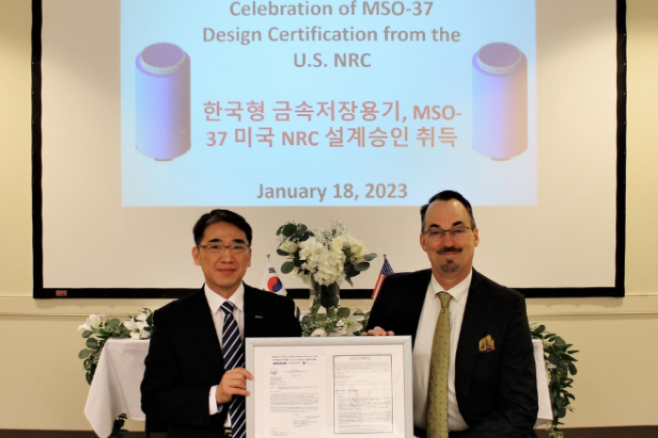South Korea's energy equipment maker Doosan Enerbility Co. has obtained the green light in participating in the domestic nuclear storage cask market.
Doosan Enerbility said on Thursday that its metal storage cask of spent nuclear fuel jointly developed with US-based nuclear and electric utility service company Nuclear Assurance Corporation (NAS) International received a design certification from the Nuclear Regulatory Commission (NRC), an independent US organization that oversees commercial nuclear power plants and other uses of nuclear materials.
The jointly developed model metal storage overpack (MSO) can store up to 37 pressurized water reactor (PWR) fuel assemblies and is the world’s first metal storage cask to have obtained design certification from the US authorities.
Compared to the conventional concrete storage casks, the newly developed metal storage cask embodies enhanced safety and significantly reduces the diameter of the cask, allowing the storage of more casks in the same space.
The spent nuclear fuel is stored in the water-filled pool for the first five years and is then moved to a cask or dry storage facility to be cooled down by air for dry storage periods.
MSO was developed for use in dry storage of spent nuclear fuel, and these containers require the highest level of special technology and experience in design and fabrication as they have to provide robust radiation shielding and structural integrity.
“With the technical capabilities recently acquired from the development and licensing experience of the metal storage cask, we plan to actively participate in spent nuclear fuel dry storage projects in the domestic market and to also contribute to the future development of casks designed for permanent disposal of spent nuclear fuel,” said Kim Jongdo, head of Doosan Enerbility’s Nuclear Business Group.
Doosan Enerbility has been trying to secure technology for a wide-ranging cask lineup for spent nuclear fuel.
It signed a technical cooperation agreement with NAC in 2015 and developed a Korean-type dry storage system Doosan-DSS21 with the capacity to safely store and transport up to 21 spent nuclear fuel assemblies in 2017.
Since then, it has released DSS24 and DSS32, upgraded models with larger storage capacity, and models that have increased storage capacity and DPC-24, which can be used for both storage and transportation of spent nuclear fuel.
In 2021, Doosan became the first Korean company to export nuclear casks to the US.
Write to Jae-Fu Kim at
hu@hankyung.com



